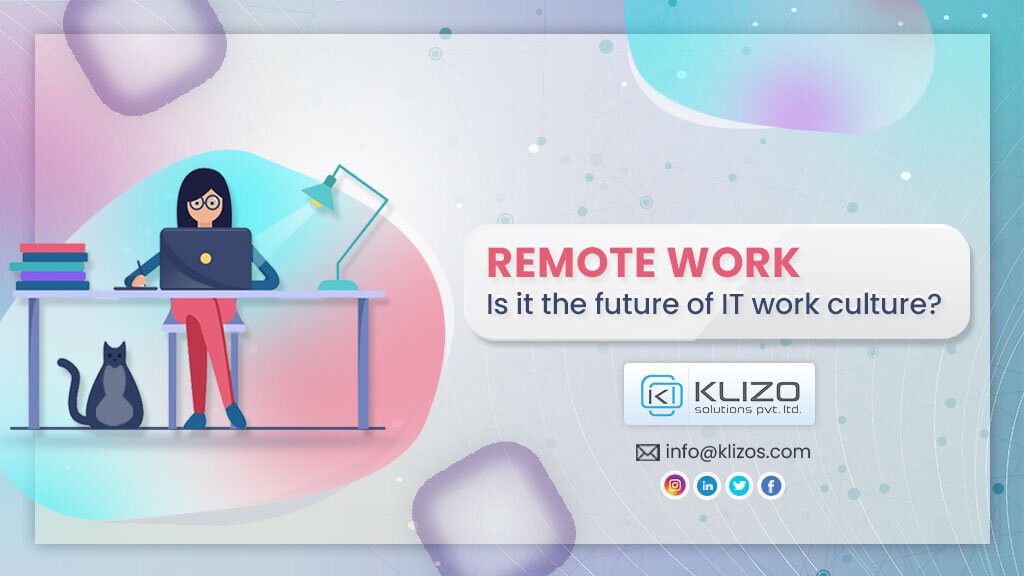


The world was doing just fine before some virus named the COVID-19 decided to wreak havoc and disrupt our normal lives. People suffered drastic consequences all over the world. This also took a toll on the global economy as businesses kept shutting down, people lost their jobs like anything!
But, thankfully, we live in a world dominated by technology, many businesses, especially the IT sector was compelled to shift their operations online and go completely virtual, adapting to the remote work culture.
Thus, remote work became the new norm for IT professionals and the entire world witnessed this revolution. What started with a small number of companies giving employees the privilege to work from home has become a normal thing for almost all businesses now.
According to an article published by Forbes, it is estimated that 70% of the companies will work remotely at least for five days a month by the end of 2025. 2020 set the trend for remote working but it just kept growing from there.
But, with the perks, also came a lot of challenges. The companies were bound to make digital and cybersecurity shifts and come up with new methods to collaborate, communicate, consult and work together with the team. And today, the majority of the companies are working remotely.
Reuters report has said that the number of professionals working remotely will double by the end of this year.

The debate on whether offices will return to normalcy or remote working will be the new permanent thing is still going on and it will go on for a long time.
But why we think remote working can be a permanent solution is because the productivity graph has been on the rise. No company has witnessed this amount of productivity before and hence, it naturally led everyone to believe that remote work could be an option. But, nobody expected it to double within just a year.
Several other surveys showed that 74% of businesses plan to make remote work a permanent option even after the pandemic is over. Big multinational giants are showing everyone the way to shift to remote working permanently.
For an instance, Twitter announced in May that employees can work remotely for as long as they want. The same policy was adopted by Facebook as well as Square and a lot of companies are following in this footsteps as well.
Now, let us have a look at some of the pros of remote working.
Waking up every morning, getting dressed, and eating breakfast is cool but what was not cool back in those days was getting out of the house and tumbling through the traffic. We used to lose more than half of our energy while rustling through the busy traffic and by the time we used to reach the office, we were all drained.
This used to affect our work as well. But, with remote working, you just get up and work from the comfort of your room. You are full of energy when you start your day and it shows better productivity as well.

I don’t know about you, but personally, I enjoy working from my own space. This is because there’s no one to interfere and I don’t have to adjust to anyone else’s choices. Staying in my own zone helps me to work better because I can concentrate on my work fully.
I can blast out the music and turn up the AC’s temperature as per my wish and not have to abide by anyone else’s preferences. Besides, there’s no need for looking super polished (except on those Zoom video meetings) and you can just work in your pajamas. Isn’t that a win-win?
This is particularly advantageous for IT firms as with almost every employee working remotely, the majority of them are using their personal resources (computers, laptops, internet connections, electricity, etc.)
It helps businesses save a significant amount of cost as they do not have to accommodate employees from the office and it means- low electricity bills, low internet bills, less use of equipment, and so on.
Thus, the heading makes sense. Even though you are not watering the plants as much as you used to, it is yielding more fruits than ever.
The best perk of remote working is that you can work from anywhere and companies can hire talent from any corner of the world. This helps the company to nitpick the best of the lot and provide them with the opportunity they deserve.
Also, recent studies have shown that employees tend to ask whether they could work remotely before deciding on a job offer. The majority of people would love to go remote permanently and are likely to choose a job that lets them have the option.
Like we mentioned before, working remotely means no hustle with the traffic, no rustling through the morning to catch the right transport, and so on. We wake up with a fresh mind, have our breakfast, and get straight to work. This helps the brain to function better and results in better work output.
These are the pros of working remotely but it comes with its challenges as well. Here are the challenges that remote working handed us.

One must have a lot of mental strength to not drown in the distractions that come with working from home. With nobody over to watch you, you might wanna go out for a quick walk, check the social media or grab something to eat. Not only that but if you are living with your family, then there are chances a lot of chaos might be going around.
Well yes, with technology you can easily communicate with your colleagues but it is not the same as sharing lunch during lunch breaks or going out together for a quick breath of air. There’s no sitting next to each other or gossiping endlessly. There’s no non-work banter and water cooler conversation! It’s mostly just working, working, and working.
Since employees are using their personal resources to work remotely, the security level might not be as high as the office infrastructure.
While we can see that remote working comes with both pros and cons, the pros definitely outweigh the cons and in the coming days, there will be a solution to the cons as well. But, is remote work going to last, or are we going to return to our normal lives that used to exist in pre-pandemic era, we don’t know that ye. Only time can tell. But what we do know is that permanent remote working definitely seems like a possibility.
Previous article
Joey Ricard
Klizo Solutions was founded by Joseph Ricard, a serial entrepreneur from America who has spent over ten years working in India, developing innovative tech solutions, building good teams, and admirable processes. And today, he has a team of over 50 super-talented people with him and various high-level technologies developed in multiple frameworks to his credit.

Subscribe to our newsletter to get the latest tech updates.